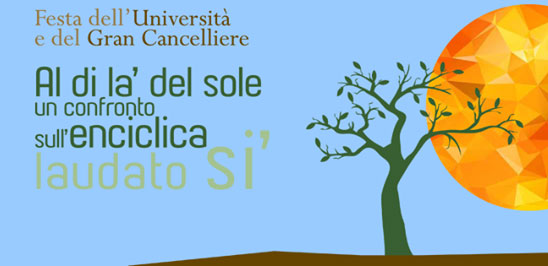19th January 2016
Life Chances: Laudato Si’ half a year on


Pope Francis’s encyclical letter Laudato Si’ – On Care for our Common Home was released to the public seven months ago. A lot has happened in the interim. Most important was an ambitious new global climate agreement secured in Paris in December, welcomed and pushed for by the British government, at which 180 countries representing 95% of global emissions committed to reduce their national emissions. Without doubt, the Pope’s encyclical helped to set the stage for that agreement, inspiring action through its clarion call for urgent global solutions.
I attended an event this week at the Pontfical Antonianum University – the academic home in Rome of the Franciscans – dedicated to Lauadato Si’. This was an appropriate venue, as the influence of St Francis of Assisi soaks through every pore of the encyclical, from the opening invocation of his Canticle of the Creatures to the final prayer. Speakers at the event reminded us of the practical moral aspect of Pope Francis’s call for action. He does not ask, ‘what should governments do?’ Instead, he asks, ‘what can we all, as individuals, do?’ At base is the Pope’s recognition that, firstly, human action has had an impact on global warming and damage to the planet, and, secondly, that we are all in it together. Both insights require each of us to take responsibility. UN Secretary-General Ban Ki-Moon said in December 2015 that “climate change is a moral issue that requires a respectful dialogue with all parts of society”.
It’s not easy. The US ambassador to the Holy See told the Antonianum gathering that meeting our commitments requires us “to break old habits”. Part of that is understanding the Pope’s intuition that we cannot tackle the impacts of climate change without recognising the interconnections between environmental damage to the planet, poverty, marginalisation and insecurity. Laudato Si’ was an urgent call ahead of COP21. But it was also looking at the longer term, and the broader condition of society.
The Prime Minister’s speech on 11 January about life chances for the poorest in the community is a good example of the interconnectedness of the challenge. Security, poverty, education, the economy and housing policy are all linked. They are all crucial elements in the health of our environment and our society. The Pope writes in the section of Laudato Si’ dedicated to the ecology of daily life that: “Authentic development includes efforts to bring about an integral improvement in the quality of human life”. The British government’s Life Chances Strategy is designed to do just that, helping the very poorest and most vulnerable in our community. That, too, is part of the Pope’s Laudato Si’ vision, and I recommend reading it again for that wider message, away from the context of the frenetic months leading up to COP21.
Dear Ambassador Baker,
Thank you for your substantive reflection on the challenge put forth by Pope Francis in his Encyclical Laudato Si’. As you indicated, it is a matter of change at all levels, beginning with the individual and continuing along the continuum to the highest levels of government. All are responsible, and are challenged to change and to seek the common good for all others and for the sake of the planet. Steven Hawking just this week raised serious concerns about life expectancy for humanity on this planet beyond the coming 100 years. Great pause for reflection and a clarion call for collective action. St. Francis of Assisi serves as a model for how change might occur, beginning with the transformation of the quality of human life, guaranteeing a respectful and humane existence for each and every person, limiting excesses by a select few, and extending this care to the poor, and from the poor to all of creation. Pope Francis reminds us not only of our responsibility to respond with an entirely new way of living; he also reminds us that this is within our grasp, something we can choose to do now. May all of us commit to this great and noble cause, for the sake of the poor and for the sake of the planet.